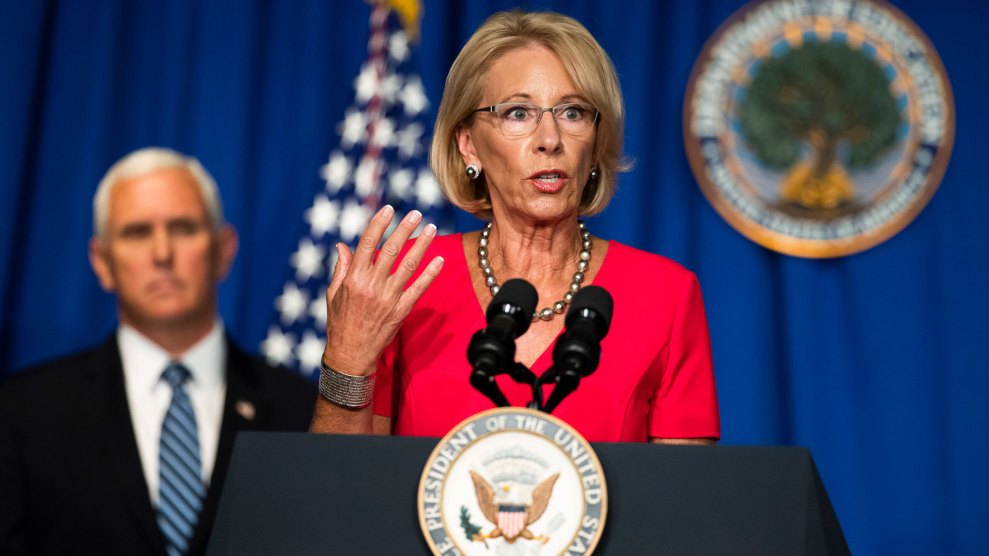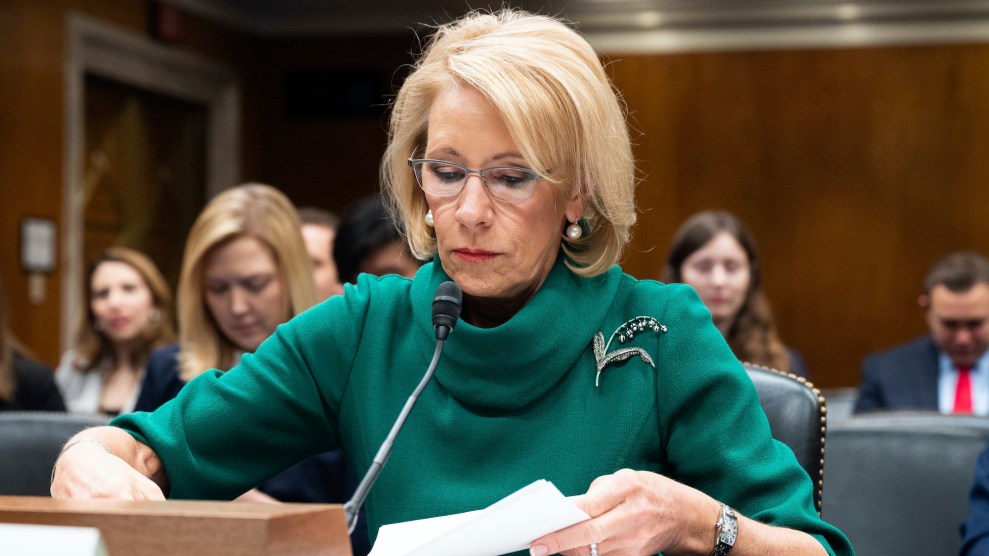
Mother Jones illustration; Courtesy of Frances Kendrick
Frances Kendrick, a 18-year-old pre-nursing student at North Carolina Agricultural & Technical State University, was scrolling through Instagram this spring when a post caught her attention. A black-and-red graphic, posted by the sexual assault survivor advocacy group Know Your IX, warned that Secretary of Education Betsy DeVos was about to institute new regulations that would reduce schools’ responsibility to respond to sexual misconduct among their students. Kendrick, who had made a sexual assault report to her school months earlier, was alarmed that the new rules would eliminate the 60-day timeframe for investigating reports; her own case was still dragging on, and she felt unsupported by NC A&T, a historically Black public university. “I automatically made that connection,” she says. “Like, oh hell, if this is how they’re treating us now, wait ’til they actually don’t have to be accountable.”
The panel convened to hear Kendrick’s case ultimately found the other student not responsible, and her appeal was denied. But Kendrick was already beginning to organize. The day after her hearing in June—which took place over Zoom due to the COVID-19 pandemic—she wrote an open letter a friend posted on Twitter. “I went to an HBCU because I wanted to live in a space where I was cared for,” she wrote. “But it is clear that this school does not care about me as a survivor.”
She started a group, Aggies Without Fear, and launched an online petition demanding the school to go “above and beyond” the requirements in DeVos’ new rules, which let schools resolve cases within a “reasonably prompt” time. Kendrick’s letter asks for investigations and hearings to be conducted within 30 days; her own case had taken nearly 200. (NC A&T associate vice chancellor Todd Simmons declined to comment on Kendrick’s case due to federal privacy laws.)
Students have always been the drivers of the movement against sexual violence in schools. Title IX, the federal law banning sex discrimination in education, has been their most powerful tool since 1992, when the Supreme Court ruled that a 10th grader could sue her school for not intervening after she reported being harassed and sexually abused by a teacher. But anti-rape advocates say much of the law’s utility to survivors has been undercut by the Trump administration’s reinterpretation of Title IX, which took effect on August 14. Now, as campuses across the country must adapt to the new rules while grappling with the coronavirus pandemic, students like Kendrick are adapting as well, looking for new ways to pressure their schools to assist students at all levels who endure sexual abuse or harassment.
“Historically, we viewed Title IX as a great tool to improve campus policies,” Sage Carson, the manager of Know Your IX, told nearly 200 victim advocates and students during a webinar about the new regulations last week. “Now, it’s a bit more figuring out how to get around Title IX.”
Trying to get school administrators’ attention while many students are not physically on campus also presents a new challenge for activists. “Often survivors have to use interruptive tactics to get schools to pay attention,” Carson says in an interview. “They need to occupy buildings. They have to make noise on campus. They have to make themselves a nuisance for schools to even listen to them. And it’s much harder to make yourself a nuisance when someone can simply block your emails, or when someone can just ignore your phone calls.”
DeVos’ new regulations follow nearly a decade of activism, conflict, and backlash over campus sexual assault policy. Survivors-turned-advocates have filed a wave of complaints with the Education Department’s Office for Civil Rights and pressured the department to hold schools accountable for violating the law. They found a sympathetic ear in the Obama White House, which launched a national task force on campus sexual assault and issued guidance on how schools could respond “promptly and equitably” to sexual misconduct complaints. Many colleges and universities began taking sexual assault and harassment more seriously, changing or adopting new policies to address it.
But the momentum shifted after President Donald Trump took office. DeVos quickly pulled the Obama-era Title IX guidelines, declaring that they had gone too far in complainants’ favor and had created a system that “lacked basic elements of due process and failed to ensure fundamental fairness.” She issued new temporary guidelines followed by proposed regulations that reduced schools’ legal obligations to respond to survivors, in part by narrowing the definition of sexual harassment.
The regulations were framed as a way to ensure fairness for both survivors and students accused of sexual misconduct. They required colleges to adopt live, courtroom-like sexual misconduct hearings in which an accused abuser’s advisor—or attorney—could cross-examine the complainant. A recent investigation in the Nation found the rules were partially written by the main funder behind the men’s rights group Stop Abusive and Violent Environments, which pushes the untrue narrative that false sexual assault allegations are rampant.
The final rules were met with fierce opposition from survivor advocates. “Students should have a right to receive an education free from violence, and not have to be tangled up in incompetent, really half-assed, dangerous rules that protect no one,” says Kenyora Parham, executive director of End Rape on Campus. Multiple groups, including the ACLU as well as attorneys general in 17 states and Washington, DC, sued the Education Department to stop the new regulations from taking effect. Federal judges blocked their attempts earlier this month.
Now colleges and universities are rolling out new Title IX policies to comply with the administration’s requirements. Some, such as Harvard and Princeton, established two separate processes for handling claims: one that covers the Education Department’s new, narrower definitions of prohibited conduct, and another for everything the new regulations do not cover, such as sexual assault on study abroad trips. NC A&T’s interim sexual misconduct policy, announced on August 14, hews closely to the new regulations, though it adds that sexual misconduct may also be covered by other campus policies governing workplace violence, harassment, and discrimination.
Still, some schools have not announced any changes, according to Carson. There’s still a lot of uncertainty about what exactly is required by the new rules, which were released in their final form three months ago along with about 2,000 pages of accompanying legalese, sending college administrators scrambling. “My impression is, everybody’s trying to write the paper and get it in on time,” one Title IX coordinator told the Chronicle of Higher Education.
Student activists like Kendrick have tried to influence this process by pressuring their schools to go beyond what’s required of them. For instance, DeVos’ rules permit, but do not require, that schools use a higher standard of evidence in sexual assault hearings; Aggies Without Fear’s petition asked NC A&T to opt for the Obama-era standard. At Carnegie Mellon University, the Graduate Student Assembly has been negotiating with the Title IX office for months, says Divyansh Kaushik, the assembly’s vice president for external affairs. Kaushik, a language technologies grad student, is concerned that the DeVos regulations do not cover violence or harassment in off-campus housing. (All 7,500 Carnegie Mellon grad students live off-campus.)
Even though some school administrators may choose to investigate cases not covered by Title IX under the DeVos rules, the Education Department will no longer hold the schools accountable if they mishandle those cases. To Carson, this is a major setback. “The reason that survivors have fought so deeply for Title IX is because schools haven’t done the right thing in the past,” she says. “Now we’re met with a really messy, complicated Title IX that is weak around enforcement, weak on survivor protections, and only requires schools to do the bare minimum. While survivors can use that to demand that their school do that absolute bare minimum, that’s not exactly helpful for most people.”
Rather than focusing on Title IX, student survivors may begin turning to other laws. During last week’s webinar, National Women’s Law Center director of justice for student survivors and senior counsel Shiwali Patel pointed to the Clery Act, a federal law governing campus safety. Public Justice staff attorney Alexandra Brodsky suggested that survivors who need accommodations from their schools might find disability discrimination laws “more powerful” tools than Title IX, particularly if they experience post-traumatic stress disorder. Parham, who plans to focus End Rape on Campus’s work on supporting survivors who have been marginalized because of their backgrounds or identities, says that advocates need to think more seriously about using other federal anti-discrimination laws.
At least 20 states already have laws that require schools to provide services to survivors, mandate sexual assault prevention programs, or govern responses to reports of harassment or violence. According to Carson, state legislation offers a lot of promise at a time when survivors feel abandoned by the Education Department. Know Your IX is recruiting students to push for new state-level sexual assault laws across the country. A group of current students and young alumni called the Every Voice Coalition has written bills that have been introduced by lawmakers in several states.
“Once it became clear that this DeVos administration was not going to be listening to students and survivors, we took the only recourse we could think of, which was to push for stronger protections at the state level,” says John Gabrieli, Every Voice’s co-chair. “Fortunately, the one silver lining with these regulations is that they’re a floor, not a ceiling, for what states can do.” In July, Gov. Chris Sununu signed Every Voice’s bill into law in New Hampshire. The group plans to introduce similar legislation in Maine, Nevada, New Mexico, and Virginia.
This spring, shortly after Gabrieli quit his job to work on Every Voice full-time, the pandemic sent students and lawmakers home. COVID-19, he says, “totally crushed our legislative momentum.” At NC A&T, Kendrick, who just moved back into her apartment on campus, is figuring out how to continue building Aggies Without Fear despite social distancing. Last Friday, she received a response from the school to her petition; it said that parts of its newly issued interim Title IX policy already go “above and beyond” DeVos’ minimum requirements. It also offered to listen to her feedback. Simmons wrote in an email that the school “strives to create an environment that is free from sexual misconduct and violence and that supports survivors, as well as respects due process,” and that it would be working to improve through “listening sessions” with students.
Kendrick is trying to keep up the pressure, using social media to push out information about Title IX and campus sexual assault while negotiating with the school. “Our goal is to say, regardless of COVID, regardless of where your students are,” Kendrick says, “you still are accountable to us. “












